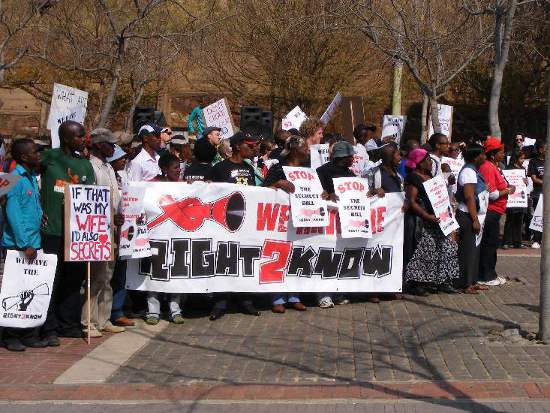 PRESS STATEMENT - RIGHT 2 KNOW CAMPAIGN
PRESS STATEMENT - RIGHT 2 KNOW CAMPAIGN
The call for a public interest defence has united public opposition to the Secrecy Bill; it has been the rallying cry of people across South Africa who have rejected any proposed law that would undermine the ongoing struggle for an open and accountable democracy.
However, despite encouraging signs, the ruling party failed to heed this call, when MPs of the NCOP made it clear on Thursday that they are not ready to address the public's concerns and deliver a full public interest defence.
In doing so, they have missed an opportunity to begin the long road of redrafting the Secrecy Bill in such a way that it cannot be used to threaten or imprison people who seek or expose the truth.
These concessions are an encouraging development nonetheless. We note and welcome the extension of the committee's deadline until the end of June - this time will be crucial in addressing the shortcomings.
Where the proposed amendments fall short:
• These amendments would improve the badly flawed whistleblower protection contained in clause 43. In this formulation, those exposing state secrets would face up fines or up to 5 years in prison unless they were protected by South Africa's existing (though inadequate) whistleblower protection laws, or unless the exposure revealed unlawful activities or was made to fulfil responsibilities handed down by law.
• However, this protection only applies to the offence in clause 43, and has not yet been made applicable to offences contained in clause 36, 38, and 49 - offences which carry penalties of between 5 and 25 years and currently have no public interest defence. In other words, this protection is an improvement, but is not meaningful until it is extended to all offences contained in the Bill.
• In the ANC's proposed amendments, the crimes of "espionage" and "hostile activities are still sufficiently broad and far-reaching that anyone who exposes information that could "directly or indirectly" benefit a foreign state face severe prison sentences - up to 25 years. This still incriminates journalists and whistleblowers who are acting in the public interest, even if it may be intended to apply only to true acts of espionage. Two improvements to these sections have been to remove prescribed minimum sentences, and to amend the offences so that one is only guilty of a crime if one "knew" their disclosure may benefit a foreign state.
• The ruling party has not budged on clauses 15 and 44, which make mere possession of classified information a crime. Even if the document were already in the public domain, one would face up to 5 years in prison for not immediately delivering the document to a police station.
• The Department of State Security is still given complete protection from any kind of state security - in terms of clause 49, there is absolutely no protection for receiving, retaining or exposing information that has been classified by this department. Thus, the complete veil of secrecy over the work of spooks remains intact.
• In addition, beyond the proposed amendments to the Secrecy Bill's offences and penalties, the committee has not addressed in any meaningful way the many unresolved issues in the rest of the Bill, as raised in the public hearings.
Right 2 Know press release.
Read SAHA's submission to the NCOP on the secrecy bill.







 PRESS STATEMENT - RIGHT 2 KNOW CAMPAIGN
PRESS STATEMENT - RIGHT 2 KNOW CAMPAIGN
